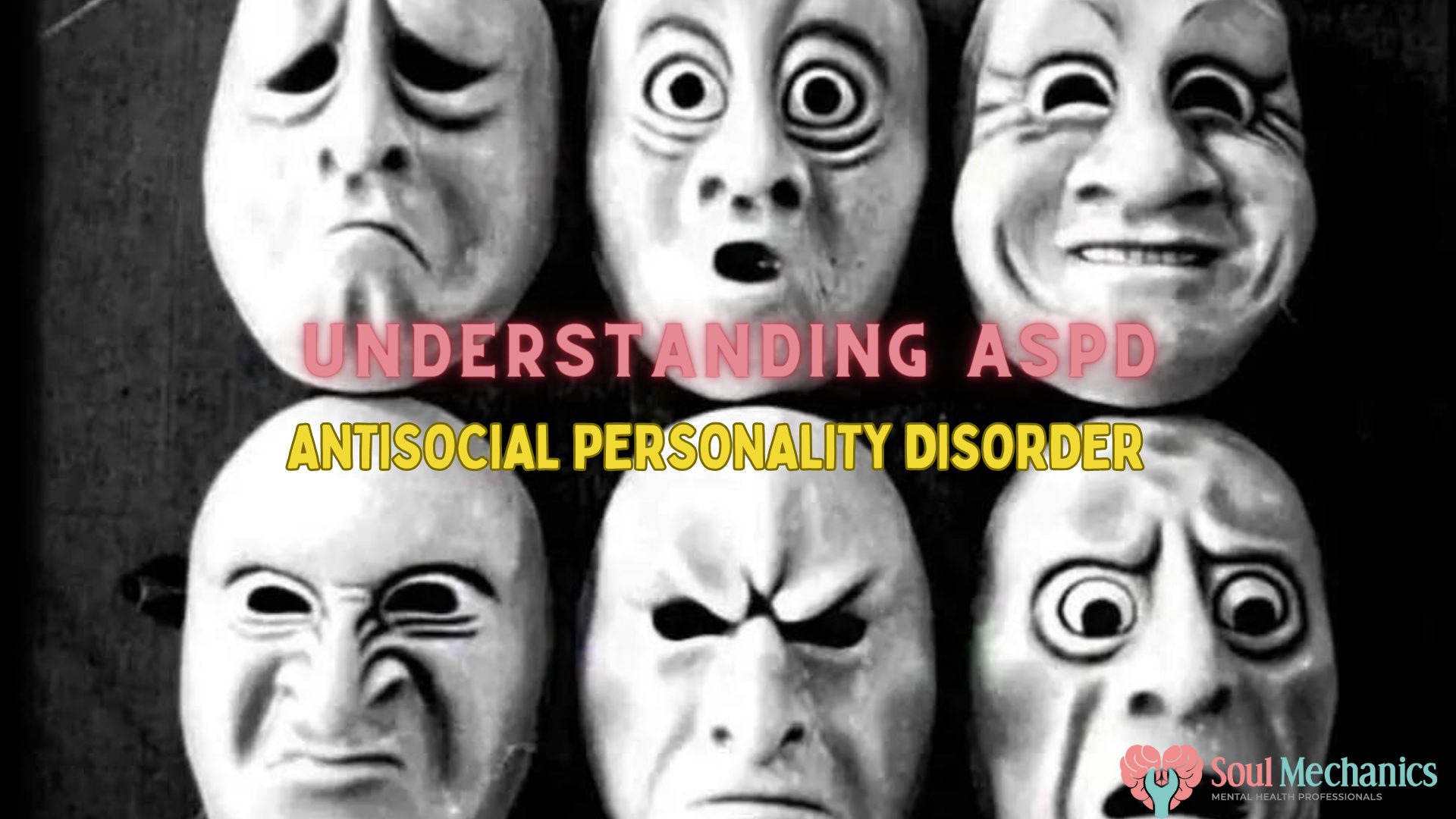Understanding (ASPD) Antisocial Personality Disorder
Understanding (ASPD) Antisocial Personality Disorder

Written By: Kelly Chan Jia Li, Clinical Psychologist (MAHPC(CP)00353)
Antisocial Personality Disorder (ASPD) is often sensationalized in movies and TV shows, but understanding this complex mental health condition requires more than media portrayals. ASPD significantly affects how individuals perceive and interact with others. This article delves into its symptoms, potential causes, and treatment options.
Reminder: If you or your loved ones are struggling with mental health conditions, please don't hesitate to reach out to us at Soul Mechanics KD or Soul Mechanics Ipoh. Remember, seeking help is not a sign of weakness but strength!
Defining Antisocial Personality Disorder (ASPD)

At its core, ASPD is marked by a persistent disregard for others' rights, deceitfulness, impulsivity, irritability, aggressiveness, and indifference to societal norms. Not everyone with ASPD displays all these traits, and their severity can vary widely. Here are the key features of ASPD:
Lack of Empathy
Individuals with ASPD often seem oblivious to others' feelings, showing a callous disregard for their well-being. They struggle to understand and empathize with emotions, often appearing indifferent to the impact of their actions.
Deceitfulness
Chronic lying and manipulation are common in ASPD. Individuals may fabricate stories to achieve personal gain or avoid consequences. This deceitfulness can involve exaggerated achievements and exploiting others' vulnerabilities.
Impulsivity
Impulsive behavior without considering consequences is a hallmark of ASPD. This leads to difficulties in maintaining stable relationships and employment. Actions may include reckless driving, substance abuse, or impulsive spending, often without regard for personal or others' safety.
Aggression
Aggressive tendencies, both verbal and physical, are typical in ASPD. Individuals may have a quick temper, frequently engaging in physical fights or violent acts over minor conflicts.

Violation of Rights
People with ASPD often disregard rules, laws, and others' well-being. This can involve criminal behavior, deceitful actions, and a blatant disregard for legal and ethical standards.
Potential Causes and Risk Factors
Understanding ASPD involves considering genetic, environmental, and neurological factors. Although the exact cause remains unclear, several elements contribute to its development.
Genetic Predisposition
Research suggests a genetic predisposition to antisocial behaviors. A family history of personality disorders or criminal behaviors increases the risk of developing ASPD.
Environmental Influences
Adverse childhood experiences, such as abuse, neglect, or exposure to violence, significantly impact ASPD development. A lack of positive role models and inconsistent parenting styles also contribute.
Brain Structure and Function

Differences in brain structure and function, particularly in impulse control, decision-making, and emotional regulation, may contribute to antisocial traits. Abnormalities in the amygdala or frontal cortex are often implicated.
Psychological Factors
Certain personality traits and psychological factors, like a lack of empathy and emotional detachment, contribute to ASPD. These characteristics may appear early in life.
Early Childhood Behavior Problems
Persistent behavioral problems in early childhood, such as conduct disorder, may precede ASPD. Children exhibiting aggressive behaviors, cruelty to animals, or rule violations are at increased risk.
ASPD Treatment Approaches and Challenges
Treating ASPD is challenging due to the nature of the disorder and individuals' reluctance to seek help. While there is no cure, intervention approaches help manage symptoms and improve functioning.
Reminder: If you or your loved ones are struggling with mental health conditions, please don't hesitate to reach out to us at Soul Mechanics KD or Soul Mechanics Ipoh. Remember, seeking help is not a sign of weakness but strength!
Psychotherapy
Clinical psychologists use Cognitive Behavioral Therapy (CBT) to address behaviors affecting relationships and societal functioning. CBT also improves moral reasoning. Dialectical Behavior Therapy (DBT) focuses on emotion regulation, interpersonal effectiveness, and distress tolerance.

Community-Based Programs
Therapeutic communities provide group therapy in supportive environments. These programs help individuals learn and practice social skills while receiving feedback from peers and professionals.
Skill-Building and Education
Educational interventions teach empathy, communication, and conflict-resolution skills. These skills help individuals with ASPD navigate social situations more effectively.
Family Therapy
Family therapy addresses and resolves family conflicts, improving communication and establishing healthier relationships. This approach is beneficial when family dynamics contribute to the individual's behavior.
Conclusion
Dispelling misconceptions about Antisocial Personality Disorder through understanding is crucial for promoting a compassionate, informed society. Treatment options exist, but the challenges highlight the importance of early intervention and a comprehensive approach. Promoting awareness and mental health education are essential steps toward supporting affected individuals and their communities.
If you’re looking for a therapist in Kota Damansara or Ipoh area, you can click here for more information.
If you enjoyed reading this, why not broaden the horizon of knowledge by learning about "Psychotherapy for Individuals with ADHD"?
You can read the blog here.
For more content related to mental health do follow us on our official Instagram.

